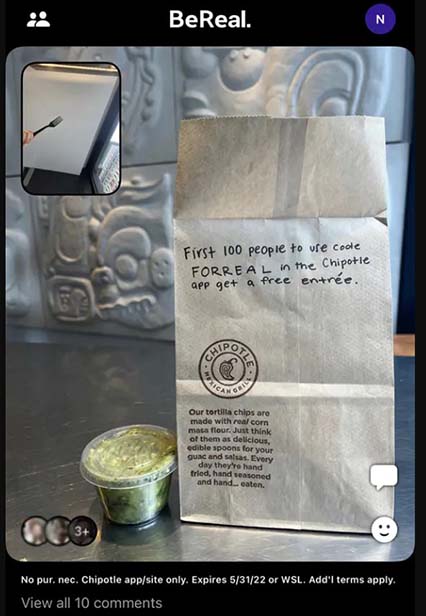Strategy July 29, 2022
Should Promo Join BeReal – the ‘Anti-Instagram’?
The latest social media craze promises low-stakes, authentic photo sharing. Its growing popularity among Gen Z and millennials is a testament to people’s frustration with the curated feeds and clout-chasing prevalent on other platforms.
BeReal, Gen Z’s new favorite social media app, is being called the “anti-Instagram,” and it’s exploding in popularity, even as social media use in general declines among Zoomers – and frustration with more established platforms grows. (Mega-influencers like Kylie Jenner and Kim Kardashian lambasted Instagram recently for doubling down on its TikTok lookalike Reels and pivoting away from photos.)
The time is ripe, it seems, for an app that promises a break from curated feeds and “a new and unique way to discover who your friends really are in their daily life.” But what, if anything, does that mean for the promo industry? Is it worth being an early brand adopter?
It’s too soon to tell whether BeReal will be a marketing game-changer like TikTok has been or more of a flash-in-the-pan like Clubhouse, but it’s certainly undergoing a growth spurt right now. The app launched in January 2020, and in the last year alone, it’s gained more than 7.5 million users, accounting for 75% of the app’s total downloads, according to the Washington Post.
And, of course, where young people flock, brands are sure to follow. Chipotle and Trident gum are among the companies experimenting with BeReal.
Dog pics work on any social media site, right? https://t.co/94FJiej6Qn pic.twitter.com/76gLmxECdu
— Theresa Hegel (@TheresaHegel) July 28, 2022
The good news for the curious is that the barrier to entry is fairly low for BeReal. It doesn’t require technical knowledge or editing software. You don’t even need to devote more than two minutes a day to posting; in fact, you can’t. The premise of BeReal is this: Every day, at a seemingly random time, the app gives you a notification to take a photo of what’s going on in your life. You only have two minutes, and the app takes a photo with your front- and rear-facing cameras simultaneously.
If you miss the notification window, you can still take and post your daily photo; however, it will appear on the site with a disclaimer sharing how many minutes or hours you were late to the proverbial party. Your photo will disappear after a day, though you can choose to archive it as a “memory” that only you can see.
Simple, right?
The more complicated prospect is determining where the pared-down app might fit into your company’s social media mix. Using the app explicitly for advertising or commercial purposes is prohibited in its terms and conditions, though brands have still found ways to build engagement despite these hurdles.
Back in May, a Chipotle employee posted a BeReal with a fork on one side and a Chipotle bag on the other. On the bag, written in marker, was a reusable promo code for a free entrée available to the first 100 users. All the promo codes had been used within 30 minutes.

A Chipotle employee snapped this pic of a promo code on a takeout bag and posted it on BeReal. In less than an hour, all 100 codes available had been used.
“The response was incredible the first day,” Candice Beck, Chipotle’s director of social and influencer, told Retail Brew.
For promotional products suppliers and distributors, the app could be a fun way to showcase employees’ personalities in a low-stakes, off-the-cuff way. Or to highlight behind-the-scenes moments in an office or production facility.
There's… another social platform??? Intrigued, but not ready to jump on. Could be neat for those in-the-moment, behind-the-scenes photos for people in our industry. 🤷
— Warwick Publishing (@WarwickPubCo) July 27, 2022
Regardless of whether BeReal itself has staying power, the current popularity of the app signals a change in the way young people in particular are choosing to engage with social media. An informal survey of ASI’s summer interns jibed with the premise of a recent Axios piece: that ephemeral posts, like Instagram “Stories” are more popular, and many prefer to share content with a small group of friends, rather than publicly. The pandemic ushered in an environment that encouraged authenticity on social media; plus, apps like BeReal and 24-hour features like Stories help alleviate some of the pressures and anxieties of trying to be perfect on social media, ASI interns pointed out. Plus, many Gen Zers have been on social media since middle school and have lost interest in the “rat race” to get more likes and followers, so the casual nature of BeReal holds a lot of appeal, they note.
“While TikTok and shorter video content continues to grow and consume social media platforms, there’s a growing demographic of users who miss what their timelines and feeds used to look like,” says Elieza Bague, social media producer at ASI. “They miss their feed being filled with what they care about most: family and friends. BeReal might be the new solution.”
